the place where Paleontology and Paleoanthropology meets Philately
Malta
Fossils and fossils found places on stamps of Malta
| << previous country | back to index | next country >> |
Contents:
- Country overview
- Philately of Malta
- Official stamps of Malta related to Paleontology
- Other stamps of Malta to consider
- References
- Acknowledgements
Malta, officially known as the Republic of Malta, is a Southern European island country consisting of an archipelago in the Mediterranean Sea. It lies 80 km south of Italy, 284 km east of Tunisia, and 333 km north of Libya.
The country covers just over 316 km2, with a population of just under 450,000, making it one of the world's smallest and most densely populated countries.
The capital of Malta is Valletta, which at 0.8 km2, is the smallest national capital in the European Union.
Malta has two official languages: Maltese and English. Malta's location has historically given it great strategic importance as a naval base, and a succession of powers, including the Phoenicians, Carthaginians, Romans, Moors, Normans, Sicilians, Spanish, Knights of St. John, French and British, have ruled the islands. [R1]
On 1 December 1860, Malta issued its first stamp, which is known as the halfpenny yellow. It was re-printed 29 times in different watermarks, perforations and shades. This stamp was used for inland postage only, while British stamps continued to be used for overseas mail.
Malta joined the Universal Postal Union in 1875, and it was the first British colony to do so. [R2]
Official stamps of Malta related to Paleontology: fossils
| 29.12.2009 definitive issue - "History of Malta" [1] | 23.05.2011 reprint of Mini-Sheet [1] | |
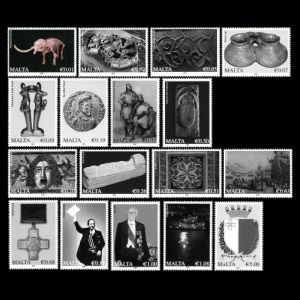 |
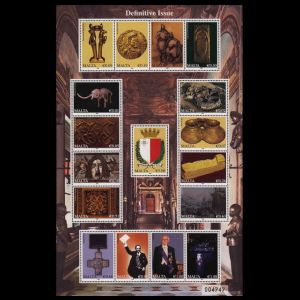 |
 |
| 19.10.2011 reprint Nr.1 [1] | 21.04.2015 reprint Nr.2 [1] | |
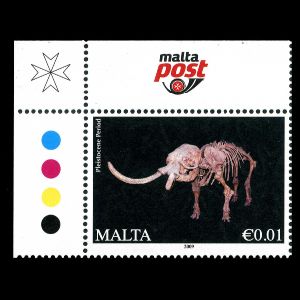 |
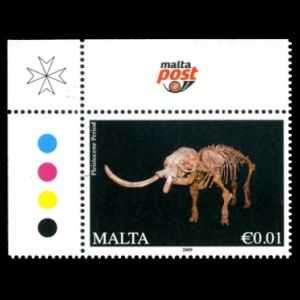 |
 |
Notes:
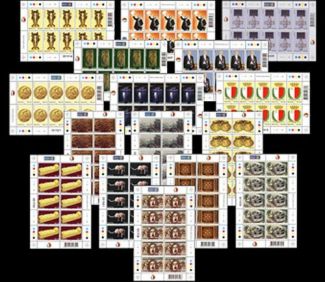
|
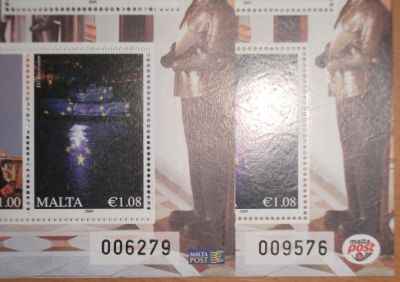
|
| Individual stamps sheets of 10 of definitive set of Malta 2009. | Different logo on the Mini-Sheets of Malta definitive stamps 2009 and 2011 |
The set consisted of 17 values issued in individual mini-sheets of 10 (2 x 5 stamps) and in a sheet with the entire set. The stamps track Malta’s historical phases and milestones by depicting relevant and iconic images from these times.
Fossilized skeleton of dwarf elephant Elephas falconeri is depicted on the stamps with the smallest face value of Euro cent 1 (€0.01).
In 2011, the sheet with the entire set of definitive stamps was reprinted. The only difference between the original mini-sheet and the reprinted sheet was the logo of the Malta Post (see image on the right) in the bottom-right corner. The 2009 sheet has the “old” square, blue logo, while the 2011 sheet has different logo.
The stamp depicting the dwarf elephant fossil was reprinted twice since 2009 – in 2011 and 2015. All three issues are slightly different:
- 2009 issue – this issue has the old blue logo of the Malta Post in the selvage.
- 2011 issue – this issue has the new logo in the selvage, with the word “Post” in red.
- 2015 issue – this issue also has the new logo in the selvage, but the logo is smaller and the word “post” is orange in color.

Other stamps of Malta to consider: fossils found places
| 16.12.2009 "Scenery" [A1] | ||
 |
|
|
Notes:
[A1] The stamp with face value €0.02 featured Reqqa Point. The stamp with face value €0.37 featured Xwejni Bay.
Both locations are places where fossils have been found on Malta’s sister island of Gozo.
References:
- [R1] Malta:
Wikipedia,
WikiTravel,
FlagCounter.
- [R2] Postal History and Philately of Malta:
Wikipedia,
Links to official website of the Post Authority, stamp catalog and a list of new stamps of Malta are here - [R3] Differences of definitive stamp reprints: StampedOut
Acknowledgements:
Many thanks to Dr. Peter Voice from Department of Geological and Environmental Sciences, Western Michigan University, for reviewing the draft page and his valuable comments.
| << previous country | back to index | next country >> |